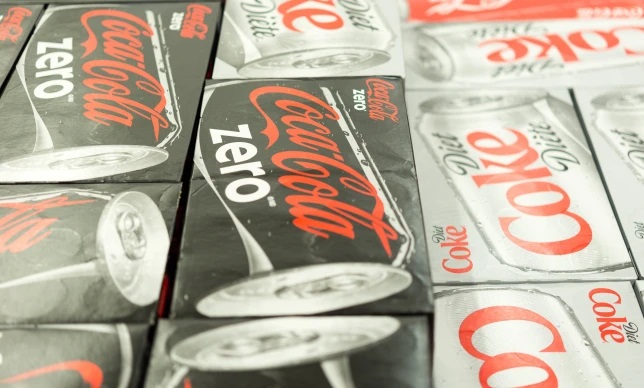The World Health Organisation (WHO) is set to declare an artificial sweetener as a possible cause of cancer.
Aspartame is used in popular products like Coca-Cola’s diet drinks and Mars Extra chewing gum.
But next month, the WHO is set to list it as ‘possibly carcinogenic to humans’, according to two sources with knowledge of the process.
The ruling won’t take into account how much aspartame someone can consume safely – that advice comes separately from a WHO expert committee on food additives.
The organisation’s committee on additives is reviewing aspartame use this year, and will announce its findings on July 14, the same day the decision on whether to declare it as carcinogenic is published.
A spokesman for the International Agency for Research on Cancer (IARC), the WHO’s dedicated cancer research arm which has been looking into the sweetener, said its findings were ‘confidential’ until July.
The additives committee ‘conducts risk assessment, which determines the probability of a specific type of harm to occur under certain conditions and levels of exposure’.
Since 1981,the additives committee has said aspartame is safe to consume within daily limits.


For example, an adult weighing 60 kg (132 pounds) would have to drink between 12 and 36 cans of diet soda – depending on the amount of aspartame in the beverage – every day to be at risk.
This view has been widely shared by national regulators, including in the United States and Europe.
The IARC’s rulings can have a huge impact – but have also sparked criticism over warnings about hard-to-avoid substances and situations.
It previously classed working overnight and eating red meat as ‘probably cancer-causing’, and using mobile phones as ‘possibly cancer-causing’.
The International Sweeteners Association has criticised the IARC’s decision-making, saying: ‘IARC is not a food safety body and their review of aspartame is not scientifically comprehensive and is based heavily on widely discredited research.’
The International Council of Beverages Associations’ executive director Kate Loatman said public health authorities should be ‘deeply concerned’ by the ‘leaked opinion’, and also warned it ‘could needlessly mislead consumers into consuming more sugar rather than choosing safe no- and low-sugar options’.
Sources close to the IARC say classing aspartame as a possible carcinogen should motivate more research into the sweetener.
Last month the WHO advised people not to use non-sugar sweeteners while attempting to lose weight, causing uproar in the food industry.
Latest Stories
-
Paris 2024: Opening ceremony showcases grandiose celebration of French culture and diversity
3 hours -
How decline of Indian vultures led to 500,000 human deaths
4 hours -
Paris 2024: Ghana rocks ‘fabulous fugu’ at olympics opening ceremony
4 hours -
Trust Hospital faces financial strain with rising debt levels – Auditor-General’s report
5 hours -
Electrochem lease: Allocate portions of land to Songor people – Resident demand
5 hours -
82 widows receive financial aid from Chayil Foundation
5 hours -
The silent struggles: Female journalists grapple with Ghana’s high cost of living
5 hours -
BoG yet to make any payment to Service Ghana Auto Group
5 hours -
‘Crushed Young’: The Multimedia Group, JL Properties surprise accident victim’s family with fully-furnished apartment
6 hours -
Asante Kotoko needs structure that would outlive any administration – Opoku Nti
6 hours -
JoyNews exposé on Customs officials demanding bribes airs on July 29
7 hours -
JoyNews Impact Maker Awardee ships first consignment of honey from Kwahu Afram Plains
8 hours -
Joint committee under fire over report on salt mining lease granted Electrochem
8 hours -
Life Lounge with Edem Knight-Tay: Don’t be beaten the third time
8 hours -
Pro-NPP group launched to help ‘Break the 8’
8 hours

